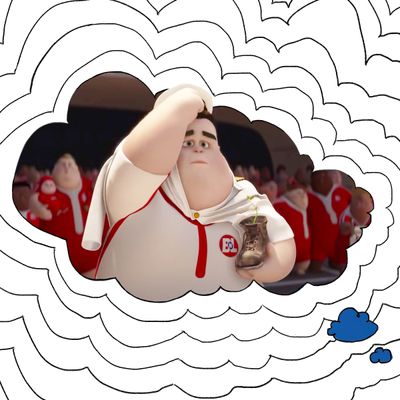
I Think About This a Lot is a series dedicated to private memes: images, videos, and other random trivia we are doomed to play forever on loop in our minds.
Wall-E, the classic 2008 Pixar film, has an ostensibly happy ending. It’s supposed to be happy, at least. A spaceship descends from the sky. A ramp drops, and a bunch of people, distended from too much time in the far-flung equivalent of the La-Z-Boy recliner, congregate at the lip of the ship, seeing their home planet, Earth, for the very first time. It is a complete and utter disaster, just like a prior generation of humans left it, with garbage everywhere and nary a life-form to be seen. But they have a vision! They will make it nice again!
I guess Wall-E is a movie about reparation and the soulful regeneration of the human spirit, but the muscleless people who have been rotating in space for centuries also think that you can plant pizza plants. So I’m not sure how hopeful the narrative really is, at the end of it all. Like, what are they actually planning to do now that they have arrived “home”? Home is a wasteland that cannot be saved. Call me dour. Call me a pessimist. I’m just trying to get real here.
The crux of the movie hinges on this idea that Earth, having been destroyed by humans, can hang on and survive — and maybe even support life again — so long as these returning humans can get their collective acts together. But the humans in question have also lived in space for generations, captive on a giant floating spaceship where they have had no need for things like farming knowledge or fine-motor skills.
Though “spaceship” doesn’t even adequately describe the Axiom, the floating universe on which the human denizens of this film have been living for centuries. The Axiom is so fully equipped with leisure options that many of its residents don’t seem to know the full menu. On earth, we think of space as boundless, but apparently life in space is limited: No one up there knows what dancing is, and many of them don’t even know that the spaceship they were born on and have lived their whole lives on has a swimming pool, which is probably where I would spend the majority of my days if I were suspended in space in a curated environment with an endless amount of time on my hands.
I’ve had time to consider this question ad nauseam, because my son has watched Wall-E about once a day since early March. I’m not entirely sure why the one movie he wants to watch on repeat right now is the one about the world basically ending. But since I have no choice regarding what we watch (what parent does?), I am left considering the likely uncomfortable fate of the humans who have arrived at the doorstep of a not-quite-happy-to-see-them planet Earth.
I know I’m supposed to feel happy that the space people found their way back to their home planet, but all I keep wondering is how these barely ambulatory beings will be able to clean up the mess left by their forebears. Also, as my son never fails to remind me, it’s pretty dirty on planet Earth (neither of us is particularly fond of dirt). Who is going to clean all of that crap up? I’m overjoyed that one plant was able to survive the apocalypse — literally a weed in a shoe — and, sure, that fact fills me with hope, but let’s be honest: These guys have a loooooong road ahead of them. And I’m not sure they’re up to the task.
Every single day at my home, with my 1-year-old and a 3-year-old, I spend about six hours picking up toys and wiping fingerprints off of relatively clean surfaces (I have tracked this, for what it’s worth). My house is the kind of house you might describe as “clean,” or “orderly.” What I’m saying is that I don’t live in a nuclear-fallout zone, and it still takes me the better part of a day to eliminate the detritus left by just two humans. Ergo: I’m just curious as to how anyone thinks that a bunch of spaceship-bound people are going to tidy up a decimated planet without sinking into a wormhole of depression.
What about the vermin? Although Wall-E, the film’s robot hero, is accompanied by a cute — and rather benign-looking — cockroach named Hal, in real life, I have to assume that the planet would be infested with less adorable versions, like the giant cockroaches that my mom used to affectionately call “water bugs” (nah, they’re just giant roaches) and also rats and bedbugs and all of the other things that space people have probably never seen but that are probably enjoying the theoretical planet now that there’s no one left to kick them to the curb. They say that roaches can survive the apocalypse, but something tells me that none of these fine folk has ever before seen a garbage bag rustle on a hot New York City night. Do they have Raid on that ship? They’re going to need a lot of Raid.
I want these puffy humans to make a go of it. I do. But I’m a pragmatist, which is why I spend an inordinate amount of time thinking about all of those cartoon people and about what I would do in this situation. Foot planted on solid, disgusting, roach-infested Earth, I’d take one look at that planet and head back to my air-conditioned cabin on my spaceship, where it’s always 70-something degrees and sunny and where cupcakes come in an easy-to-eat cup. Crisis averted, I’d head straight for the pool, and then I’d teach everyone the tango.

